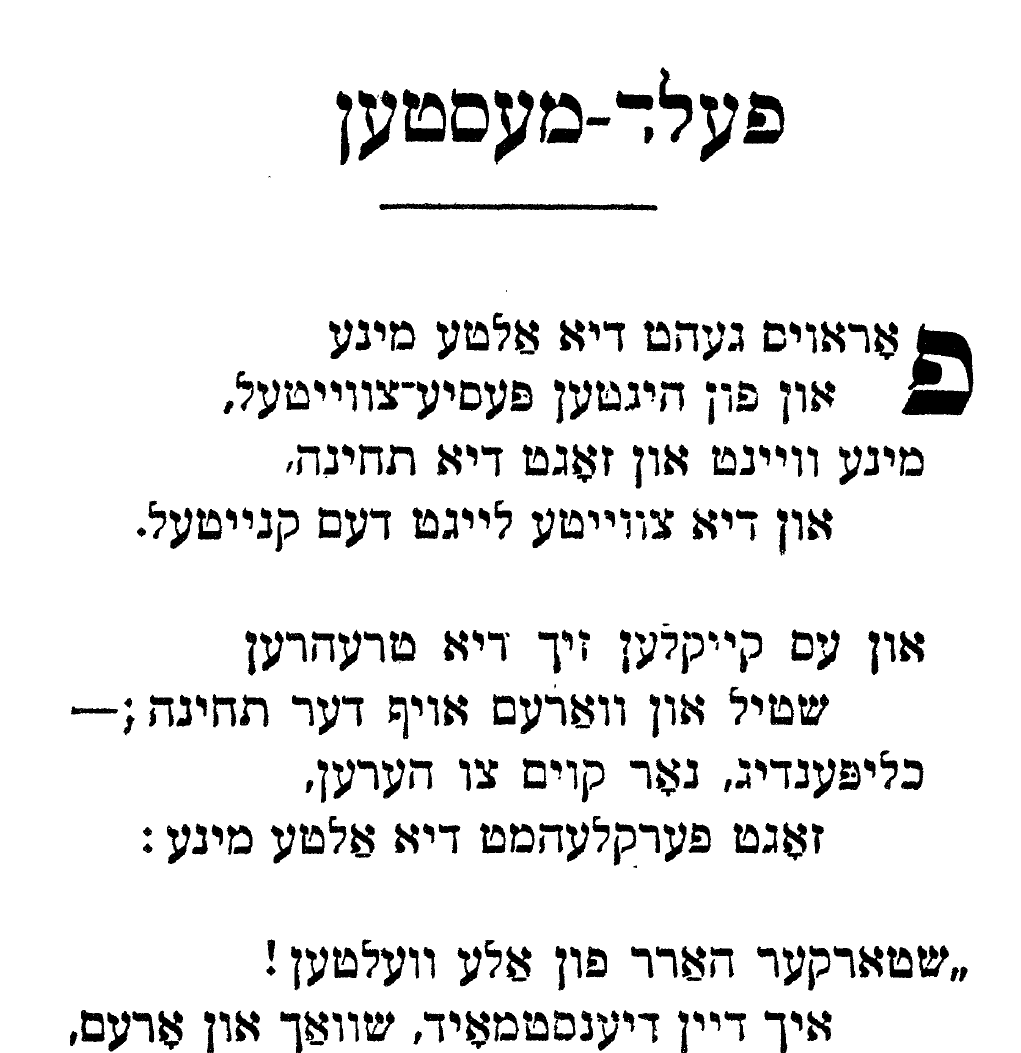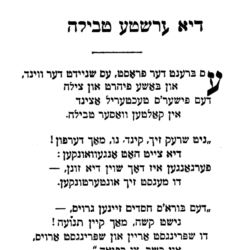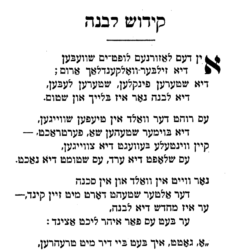| Source (Yiddish) | 1898 Transliteration, Leo Wiener (Romanization) | 1898 Translation, Leo Wiener (English) | 1914 Rhyming Translation, Rose P. Stokes & Helena Frank (English) |
|---|---|---|---|
פעלד־מעסטען |
Feldmesten |
The Measuring of the Graves |
Measuring of the Graves |
פאָראויס געהט דיא אַלטע מינע און פון הינטען פּעסיע־צווייטעל, מינע וויינט און זאָגט דיא תחינה, און דיא צווייטע לייגט דעם קנייטעל. |
Seht — varaus die alte Mine Un’ vun hinten Peßje⸗Zweetel! Mine wēint un’ sāgt die Tchine, Un’ die Zwēite lēgt dem Knoetel. |
See! In front is old Minneh and behind Pessyeh-Tsvaitle! Minneh weeps and says her prayer, while the other lays the yarn. |
First old Minna, bent and lowly, Eyes with weeping nearly blind; Pessyeh-Tsvaitel, slowly, slowly, With the yarn creeps on behind. |
און עס קייקלען זיך דיא טרעהרען שטיל און װאַרעם אויף דער תחינה;— כליפּענדיג, נאָר קוים צו הערען, זאָגט פערקלעהמט דיא אַלטע מינע: |
Un’ es keiklen sich die Trähren Still un’ warem auf der Tchine: — Chlipendig, nor kaum zu hören, Sāgt varklemmt die alte Mine: |
And the tears roll, silent and hot, on the prayerbook; sobbing, but scarcely audible, old Minneh says, with oppressed heart: |
On the holy book of Minna Fall the tear-drops—scarce a word (For the heart is moved within her) Of her praying can be heard. |
„שטארקער האַרר פון אַלע וועלטען! איך דיין דיענסטמאָיד, שװואַך און אָרעם, מעסט דיא רוהיגע געצעלטען, דיא צדיקים’ס שטילע קברים. |
„Starker Harr vun alle Welten! Ich, dein Dienstmoid, shwach un’ ārem, Mest’ die ruhige Gezelten, Die Zadikim’s stille Kworim. |
“Strong Lord of all the worlds! I, thy handmaid, weak and poor, measure the quiet abodes, the still graves of the just. |
“Mighty Lord, whose sovereign pleasure Made all worlds and men of dust, I, Thy humble handmaid, measure, God, the dwellings of the just. |
„אלע בּערגעלאַך דיא שטומע מעסט איך, גוטער גאָטט, אַצינדער, וואו עס רוהען דיינע פרומע, דיינע הייסגעליעבּטע קינדער, |
„Alle Bergelach die stumme Mest’ ich, guter Gott, azünder, Wu es ruhen deine Frumme, Deine hēißgeliebte Kinder, |
“All silent mounds I now measure, good God, where there rest thy pious, thy warmly beloved children, |
“Speechless here the ground they cumber, Where the pious, gracious God, Where Thy heart’s beloved slumber Underneath the quiet sod. |
„וועלכע זינגען דאָרטען שירה פּאַר דיין שטוהל אין הויכען הימעל, יעדער איינער פון זיין דירה דורך זיין אייבּיג זיסען דרימעל. |
„Welche singen dorten schire Var dein stuhl in hōchen Himmel, Jeder Ēiner vun sein Dire, Durch sein ēbig süßen Drimmel, |
“Who sing the Hymns before thy throne in the high heaven, each one from his habitation, through his eternal, sweet dream. |
“They who sing in jubilation. Lord, before Thy holy seat. Each one from his habitation, Through the dream for ever sweet. |
„און פון דעם געלייגטען קנייטעל ועט מיט פורכמיגקייט און מורא מאַכען ליכט דיין פּעסיע־צווייטעל, אום צו לערנען, גאָטט, דיין תורה, |
„Un’ vun dem gelēgten Knoetel Wet mit Forchtigfeit un’ Mōre Machen Licht dein Peßje⸗Zweetel, Um zu lernen, Gott, dein Tōre, |
“And with this measured yarn thy Pessyeh-Tsvaitle will make candles in awe and fear, in order, O God, to study thy Law by it, |
“From the yarn with which I measure, Pessyeh-Tsvaitel, filled with awe, Wicks will make, to search the treasure. Nightly, of Thy holy Law. |
„אום צו בּעטען דיך מחילה, אַז דו זאָלסט שוין פּאָרט דערהערען יעקב’ס אמת’דיגע תפילה און דערזעהן ישראל’ס טרעהרען !“…. |
„Um zu beten dich Mechile, Dās du sollst schōn fort derhören Jajnkew’s emesdige Tfile Un’ dersehn Jisrojel’s Trähren!“ . . . |
“And to ask thy forgiveness, that thou mayest, at last, hear Jacob’s fervent prayer, and accept the tears of Israel.” |
Praying still, by faith sustained: ‘Thou with whom the holy dwell, Scorn not Jacob’s prayer unfeigned, Mark the tears of Israel!'” |
This is the poem “פעלד־מעסטען” by Morris Rosenfeld (1862-1923) written sometime before 1898. (If you know the date of the earliest publication of this poem, please leave a comment or contact us.) We have transcribed the poem as it was published in Rosenfeld’s collection of poems Gezamelṭe lieder (1906) pp. 135-136. The poem was romanized and translated into English by Leo Wiener and published under the title, “Feldmesten (The Measuring of the Graves)” in Songs from the Ghetto (1898), pp. 46-49. A rhyming translation by Rose Pastor Stokes & Helena Frank under the title, “Measuring of the Graves” was published in Songs of Labor and Other Poems (1914), pp. 70-71. I have set these all side-by-side for the first time ever. –Aharon Varady
Source(s)




“פעלד־מעסטען | Feldmesten | Measuring of the Graves, a prayer-poem by Morris Rosenfeld (before 1898)” is shared through the Open Siddur Project with a Creative Commons Attribution-ShareAlike 4.0 International copyleft license.










Leave a Reply